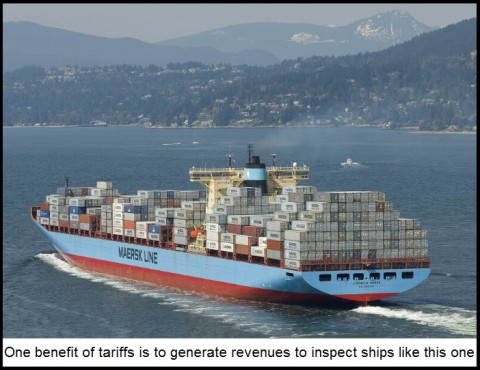[Rick’s Picks once again goes off the beaten path with a guest commentary on patents from forum regular Ben Rositas. For reasons that he makes clear, patents and free markets go hand in hand. Moreover, to the extent tariffs support this, they are justified. RA]
Today I hope to illustrate — by explaining what they are not– why patents allow free markets to exist at all. Consequently, the link between patent and tariff will be revealed, in turn revealing the inextricable link among patent, tariff, and free market. I will begin with two interpretations of the U.S. Constitution, Article I , section 8, cls 8. Brackets denote separations that aren’t readily apparent.
“To promote the progress of science and useful arts, by securing [for limited times] to authors and inventors the exclusive right to their respective writings and discoveries.”
Here, exclusive right belongs to someone, thus granting monopoly for the patent duration. And since it doesn’t say “for a limited time,” it is infinitely renewable. Conflicting with founding and framing principles, that interpretation is surely invalid. But if the brackets are expanded to include “to authors and inventors” the innovators are instead given limited, renewable durations, while
exclusive right is secured to the patented thing. In the broader context of Article I, section eight — Congressional powers in foreign/domestic matters — the exclusive right is in the domestic market (otherwise it contradicts founding principles). Taken this way, competitive economic freedom is neither hindered nor obliterated.
Free People Want Patents
Exclusive right by patent means that foreign copies are infringement via smuggling. Ideas can be traded, explored, modified, reproduced, and patented, even if these are already done in multiple countries. And since domestic copies aren’t infringement, nor domestic competitors barred from discovering or importing new ideas, improvement is actually encouraged. Copies being the same, consumer choice cannot be trampled. And price competitiveness should be a slim-to-nonexistent factor — provided that a domestic and foreign copy alike were produced and sold without price/wage controls and/or internally hindered competition in copying and innovation.
But this is interventionist policy, right? Well, free people naturally want patents. All else aside, they are reliable and useful information. When products A,B and C cannot enter countries D, E and F, fear and blind speculation disappear to more efficient and available capital. With less risk and malinvestment, but more available capital and competitive production, the alternatives — authorities and the wild cycles of total economic freedom — become unappealing nonsense.
And what of tariffs? It should now be easier to see and justify one — and perhaps only — purpose of tariffs. While benign in nature, legal foreign imports are the potential means through which infringement can occur. Naturally, tariffs pay the cost of providing port security that can both adequately inspect and expediently clear shipments. (Click here for a free trial to Rick’s Picks, including actionable daily trading recommendations and access to a 24/7 chat room that draws veteran traders from around the world.)


Hey Rick, you need to talk to Monsanto and get some tips.
I believe the patent system makes people greedy and lazy and is not all it’s cracked up to be. It wasn’t created to protect the common genius, but to protect big business cash cows.
Tesla had hundreds of patents in his lifetime and it didn’t do him much good at the time, JP Morgan saw to that. Whilst the American people stood by and let a true genius get crushed by a tyrant and die in relative obscurity.
Regards